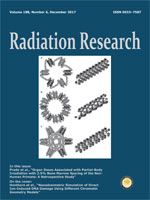Efforts to protect astronauts from harmful galactic cosmic radiation (GCR) require a better understanding of the effects of GCR on human health. In particular, little is known about the lasting effects of GCR on the central nervous system (CNS), which may lead to behavior performance deficits. Previous studies have shown that high-linear energy transfer (LET) radiation in rodents leads to short-term declines in a variety of behavior tests. However, the lasting impact of low-, medium- and high-LET radiation on behavior are not fully defined. Therefore, in this study C57BL/6 male mice were irradiated with 100 or 250 cGy of γ rays (LET ∼0.3 KeV/μm), 10 or 100 cGy of 1H at 1,000 MeV/n (LET ∼0.2 KeV/μm), 28Si at 300 MeV/n (LET ∼69 KeV/μm) or 56Fe at 600 MeV/n (LET of ∼180 KeV/μm), and behavior metrics were collected at 5 and 9 months postirradiation to analyze differences among radiation qualities and doses. A significant dose effect was observed on recognition memory and activity levels measured 9 months postirradiation, regardless of radiation source. In contrast, we observed that each ion species had a distinct effect on anxiety, motor coordination and spatial memory at extended time points. Although 28Si and 56Fe are both regarded as high-LET particles, they were shown to have different detrimental effects on behavior. In summary, our findings suggest that GCR not only affects the CNS in the short term, but also has lasting damaging effects on the CNS that can cause sustained declines in behavior performance.
How to translate text using browser tools
29 September 2017
Long-Term Deficits in Behavior Performances Caused by Low- and High-Linear Energy Transfer Radiation
Rutulkumar Patel,
Hiroyuki Arakawa,
Tomas Radivoyevitch,
Stanton L. Gerson,
Scott M. Welford
ACCESS THE FULL ARTICLE

Radiation Research
Vol. 188 • No. 6
December 2017
Vol. 188 • No. 6
December 2017




